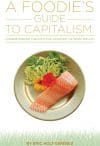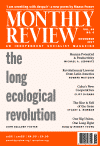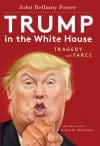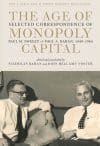Political Economy

“Monopoly capital” is a term for the new form of capital, embodied in the modern giant corporation, that in the late nineteenth century began to displace the small family firm as the dominant economic unit, marking the end of the freely competitive stage of capitalism. | more…

The Challenge to Secure Exit
With the structural crisis of the capital system, the expansionary historic circle through which capital could dominate humanity for a very long time is perilously closing. That closure brings with it the danger of humanity’s total destruction in the interest of capital’s absurdly prolonged rule. | more…

Longtime readers of Monthly Review would likely agree that the world is a colder, darker place without Doug Dowd, economist, activist, writer, teacher, and friend. He was a rock-bottom radical, a measure of the very best in the human soul. | more…

Forthcoming in November 2018
This is the first volume of the autobiography of Samir Amin, who, born in Cairo in 1931, became a world-renowned Marxist economist, intellectual, and revolutionary. | more…

Capitalism drives our global food system. Everyone who wants to end hunger, who wants to eat good, clean, healthy food, needs to understand capitalism. This book will help do that. In his latest book, Eric Holt-Giménez takes on the social, environmental, and economic crises of the capitalist mode of food production. Drawing from classical and modern analyses, A Foodie’s Guide to Capitalism introduces the reader to the history of our food system and to the basics of capitalism. In straightforward prose, Holt-Giménez explains the political economics of why—even as local, organic, and gourmet food have spread around the world—billions go hungry in the midst of abundance; why obesity is a global epidemic; and why land-grabbing, global warming, and environmental pollution are increasing. | more…

Over the last three decades, Monthly Review has stood out as a major source of ecosocialist analysis. This has been especially evident in recent months, with the publication by Monthly Review Press of three pathbreaking books: Kohei Saito, Karl Marx’s Ecosocialism: Capital, Nature, and the Unfinished Critique of Political Economy; Ian Angus, A Redder Shade of Green: Intersections of Science and Socialism; and Fred Magdoff and Chris Williams, Creating an Ecological Society: Toward a Revolutionary Transformation. | more…

Historians have long documented the ways that capitalism drew its early accumulation from the dispossession of commonly owned resources—a process that continues to this day. Building a socialist society and economy can be thought of as a reversal of this process—a reclaiming of commons. The resources that contribute to human development do so best when shared and governed democratically. This includes not only the forests and fields of the pre-capitalist past, but also education and health care systems, parks and streets, waterways, and the shared culture, knowledge, and productive resources of a society. | more…

Remember that metaphor about the frog that slowly cooks to death in the pot of increasingly warm water? Leftists have used it for years to describe how people can accept dwindling health care, fading job opportunities, eroding racial and gender equality—as long as the loss occurs gradually. Now, with Donald Trump having slouched off to Washington, most of the mainstream media are working overtime to convince us that we can still stand the heat. Leave it to John Bellamy Foster, one of the world’s outstanding radical scholars, to expose Trump for who and what he is: a neo-fascist. Just at the boiling point, Foster offers us cool logic to comprehend the system that created Trump’s moral and political emergency—and to resist it. | more…

Women's Labor and Resistance in Eastern India
Neoliberal development has opened the eastern Indian state of Odisha to mining companies and steel conglomerates, threatening the region’s ancient subsistence economies and provoking a fierce resistance, in which women have taken a leading role. | more…

Despite its inherent hazard of excess capacity, capitalism is distinguished by the vast, long-run expansion of its productive forces. How come? To answer this, we need to move from theory to history. | more…

Paul A. Baran and Paul M. Sweezy were two of the leading Marxist economists of the twentieth century. Their seminal work, Monopoly Capital: An Essay on the American Economic and Social Order, published in 1966, two years after Baran’s death, was in many respects the culmination of fifteen years of correspondence between the two, from 1949 to 1964. During those years, Baran, a professor of economics at Stanford, and Sweezy, a former professor of economics at Harvard, then co-editing Monthly Review in New York City, were separated by three thousand miles. Their intellectual collaboration required that they write letters to one another frequently and, in the years closer to 1964, almost daily. Their surviving correspondence consists of some one thousand letters. | more…

For this special issue, MR has invited some of the most profound left thinkers in the world to reflect on the legacy of revolutions and counterrevolutions around the world since 1917. Naturally, these authors do not all offer similar perspectives or come to the same conclusions. Nor should they—the historical issues are too complex and the human stakes are too high. | more…











